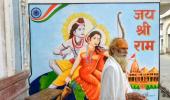
The Supreme Court on Saturday held that the 1989 lawsuit filed on behalf of deity 'Bhagwan Sri Ram Lalla Virajman' was not time barred as its 'puja sewa' continued even during the existence of disputed mosque in Ayodhya.
The Law of Limitation provides for mandatory filing of a lawsuit within a fixed statutory time period after the cause of action arises in favour of an aggrieved person.
The Sunni Waqf Board, which was allegedly dispossessed from the site after the attachment of property following the alleged placing of idols inside the central dome on December 22/23, 1949, had to file the lawsuit within 12 years of the incident.
A five-judge Constitution Bench headed by Chief Justice Ranjan Gogoi rejected the fervent plea of Muslim parties that the lawsuit, filed by the next friend of the deity, was time barred as the cause of action started in 1949 and the lawsuit was filed in 1989.
The top court, which upheld the specific finding of the Allahabad high court that the place below the central dome of the disputed structure was the birth place of Lord Ram, extensively dealt with the objection of other side on the Limitation aspect.
While assessing whether the deity's lawsuit was time barred, one thing has to be considered that in other cases, filed by devotee Gopal Singh Visharad, Nirmohi Akahara and the Sunni Waqf Board, the deity was not made a party, it said.
'The averment in Suit 5 (of deity) is that both the first (Ram Lalla) and second plaintiffs (the birth place) have a distinct juridical personality of their own. The first plaintiff has a distinct juridical personality independent of the worshippers,' it said.
'Significantly, even after the attachment of the disputed property on December 29, 1949 the 'sewa-puja' of the plaintiff deities continued.
'Therefore, it cannot be contended that the cause of action in Suit 5 (of deity) arose on December 29, 1949 and pertains to the obstruction of worship and prayer or the attachment of the disputed property,' it said.
The apex court concurred with the findings of Justice Sudhir Agarwal of the high court on the aspect of limitation.
Referring to historical faith and belief of Hindus and their continued prayer even after construction of mosque, Justice Agarwal had held that 'worship of the deities had continued and there was no action or inaction in respect of which the plaintiffs could claim a right to sue governed by a particular period of limitation'.
The apex court quoted the HC judge and said that he had also said 'in the preceding few hundred years, the only action which may have arisen to adversely affect the interest of the plaintiffs was the raising of the disputed structure.
'In spite of this, the place in dispute continued to be used by the Hindus for the purposes of worship. On the other hand, there is no mention of any Muslim having offered namaz from the date of the construction until 1856-57.'
The HC judge had said that there was no action for Hindus to be aggrieved on a particular date, giving rise to a right to sue for the purposes of limitation.
Concurring with the findings, the apex court in its 1,045-page verdict said: 'Simply put, Suit 5 contains a plea that by virtue of the deity not being a party to the earlier suits, its interests and concerns were not being adequately protected in the earlier suits including those instituted by the Hindu parties.
'The reasons which weighed with Justice Agarwal in holding Suit 5 to be within limitation, to the extent summarised above, commend themselves for acceptance. On the basis of the above discussion, it must be held that Suit 5 is instituted within the period of limitation.'
The apex court dismissed an appeal of the Shia Central Board of Waqf, Uttar Pradesh, against the final judgment of March 30, 1946 of the Civil Judge, Faizabad holding the Babri mosque as a Sunni Waqf property.
The bench said that there is an 'inordinate delay of 24,964 days in the special leave petition' filed by the Shia Central Board of Waqf, Uttar Pradesh.
The Shia Board had lost the case in the lower court on grounds including the fact that the Babri mosque had a Sunni 'Mutawali' (custodian).










